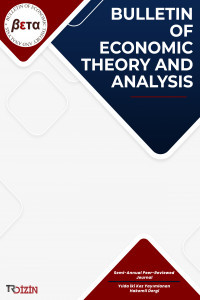Finansal Serbestleşme ve Kriz: Türkiye İçin Bir Analiz
Küresel finansal kriz sonrasında yapılan çalışmalarda, sermaye hareketlerinin serbestleştirilmesinin ekonomik krizler üzerindeki etkisi yeniden önemli bir tartışma konusu olmuştur. Bu çerçevede çalışmada öncelikle finansal serbestleşme ve yol açtığı krizlere dair kısa bir literatür taraması yapılmıştır. Ardından Türkiye için, doğrudan yabancı yatırımlar hariç spekülatif olan net sermaye girişlerinin ekonomik büyüme üzerindeki etkisini belirlemek üzere, 1989–2014 yıllarını kapsayan bir regresyon analizi yapılmıştır. Analiz sonucuna göre sermaye girişleri ile ekonomik büyüme arasında aynı yönlü güçlü bir ilişki tespit edilmiştir. Sonuç olarak ülkeye sermaye girişinin arttığı dönemlerde büyüme oranı da artarken; sermaye girişinin (çıkışının) azaldığı (arttığı) dönemlerde ise ekonomi daralmıştır.
Anahtar Kelimeler:
finansal serbestleşme, finansal kriz, sermaye girişi
Financial Liberalization and Crisis: An Analysis for Turkey
The effect of the liberalisation of capital movements on financial crisis has been an important subject of debate again in studies carried out after global financial crisis. With in this scope, first the literature was searched about financial liberalisation and the crisis it caused in this study. After a regression analysis including the years of 1989–2014 was made in this study to find out how the economic growth was influenced by speculative net capital inflows except direct foreign investments for Turkey. According to the analysis results, it has been determined that capital inflows and economic growth has a directly proportional relationship. Inconclusion, when the capital flow in the country rose, the growth rate increased too; however, the economy was constricted when capital inflow (outflow) decreased (increased).
Keywords:
financial liberalization, financial crisis, capital inflow,
___
- Arestis, P. & Demetriades, P. (1999). Financial Liberalization: The Expereince of Developing Countries. Eastern Economic Journal, 25(4), 441–457.
- Yayın Aralığı: Yılda 2 Sayı
- Başlangıç: 2016
- Yayıncı: Mehmet SONGUR
Sayıdaki Diğer Makaleler
Kemer Sıkma Politikaları: Krizden Çıkış Stratejisi mi?
1960-2010 Döneminde Türkiye’den OECD Ülkelerine Gerçekleşen Göçün Çekim Modeli ile Analizi
Gönül MURATOĞLU, Yusuf MURATOĞLU
Finansal Serbestleşme ve Kriz: Türkiye İçin Bir Analiz
Tülin Tunç Deveci, Eylül Ece Demir
Nitelik Uyarlanmış Beşeri Sermaye Endeksi 1976-2013
Developmental State: A Theoretical and Methodological Critique
